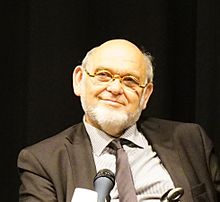Robert Hue
| Robert Hue | |
|---|---|
 |
|
| Senator from Val-d'Oise | |
|
Assumed office 1 October 2004 |
|
| Preceded by | Marie-Claude Beaudeau |
| President of the French Communist Party | |
|
In office 28 October 2001 – 8 April 2003 |
|
| Secretary | Marie-George Buffet |
| Preceded by | Maurice Thorez (1964) |
| Succeeded by | Office abolished |
| National Secretary of the French Communist Party | |
|
In office 29 January 1994 – 28 October 2001 |
|
| Preceded by | Georges Marchais |
| Succeeded by | Marie-George Buffet |
| Personal details | |
| Born |
19 October 1946 Cormeilles-en-Parisis |
| Political party | French Communist Party |
| Spouse(s) | Marie-Edith |
| Children | 2 |
Robert Hue, in full Robert Georges Auguste Hue (born 19 October 1946), is a French politician who was National Secretary of the French Communist Party (PCF) from 1994 to 2001 and President of the PCF from 2001 to 2002. He served as a Deputy in the National Assembly of France from 1997 to 2002, and he has served in the Senate of France since 2004.
Hue was a candidate in the 1995 presidential election, in which he received 8.7% of the vote, and in the 2002 presidential election, in which he won 3.37%.
He is married to Marie-Edith, and he is father of two (Charles and Cécilia).
Hue was born at Cormeilles-en-Parisis, Val-d'Oise in 1946. His family professed Communist beliefs, and Hue, as a child, sold issues of the Party newspaper, L'Humanité. He studied at the technical school in Cormeilles-en-Parisis, sang in a rock band called Les Rapaces under the alias Willy Barton, and practiced judo (winning an intercollegiate medal and receiving a black belt nidan).
Age sixteen (1962), he entered the youth section of the PCF, and then the Party itself. After studying in Paris and becoming an orderly, he was employed in a psychiatrical institution in Argenteuil.
Close to Georges Marchais, Hue climbed the steps in the Party hierarchy, being also elected mayor of Montigny-lès-Cormeilles in 1977. He was to be reelected for all possible terms, until 2001. In February 1981, he was brought briefly under the spotlight, by starting a campaign against a family of immigrants, whom he had accused of selling drugs (a "charge" that was based mainly on hearsay). This seemed strange to the public opinion in France, as Hue had been (and was to remain) a strict follower of the Party lines.
...
Wikipedia
